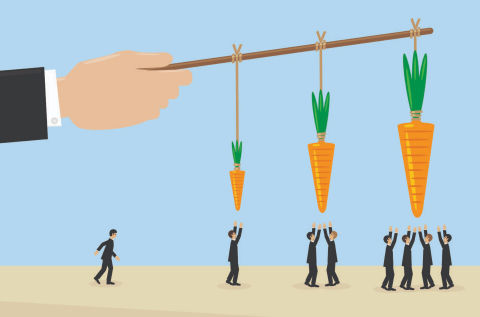

This article is an excerpt from the Shortform summary of "Freakonomics" by Steven Levitt and Stephen Dubner. Shortform has the world's best summaries of books you should be reading.
Like this article? Sign up for a free trial here .
What are incentives in economics? Are there different kinds of incentives?
In the book Freakonomics, Stephen J. Dubner and Steven Levitt explain what incentives are when it comes to economics. They break down the three different types of incentives and provide examples.
Keep reading to learn about incentives from Freakonomics.
What Are Incentives?
At their most basic, incentives are stimuli that encourage “good” behavior and discourage “bad” behavior. (Think of how you might give a dog a treat for sitting when she’s told to). As we’ll see throughout Freakonomics, incentives are a key driver of human behavior.
Incentives create an entire mental framework in which human beings think and act. Understanding them enables us to better understand the choices people make. Choices that seem perplexing on the surface often look perfectly rational in light of hidden incentives.
Economics is the Study of Incentives
There are three main kinds of incentives:
Economic Incentives
This is the type we’re most familiar with. Economic incentives provide tangible rewards to people for engaging in productive behavior and penalties on people for destructive behavior. Getting a raise at work for exceeding expectations, a speeding ticket, or even being sentenced to prison (which deprives one of one’s freedom and livelihood), are all economic incentives.
Social Incentives
Social incentives are rooted in our natural desire to be looked upon favorably by others. On the flip side, we fear being shamed and looked upon disfavorably by our peers. To harness social incentives, many jurisdictions in the US have started publishing the names and photos of people arrested for prostitution-related offences—likely a far stronger deterrent than a $500 fine!
Moral Incentives
Most of us want to do what we consider to be “right,” and avoid doing things that we consider to be “wrong.” Thus, there is a powerful moral incentive against committing crimes or engaging in any behavior that causes harm to others. Uniquely, moral incentives are self-enforced—only we as individuals can hold ourselves accountable on moral grounds.
Incentive Design is Critical
Because incentives are effective, economists are fond of devising incentive-based solutions to real-world problems. Unfortunately, people acting in bad faith will always try to “game” or abuse the incentive to gain an advantage. Poorly designed incentive systems can backfire completely and produce unintended, destructive behavior.
Therefore, incentives need to be well-designed. Properly designed incentives promote the intended behavior without allowing people to profit from unintended behaviors. We’ll cover three key examples of how well-meaning incentives caused unintended consequences.
Example: Parents Late to Daycare Pickup
A day-care center requires parents to pick up their kids by 4PM. But inevitably some parents are late. This is costly—the kids are anxious, and the teachers have to stay late to watch the kids. How do you fix this with incentives?
Here’s a simple fix: fine a parent each time they’re late. Theoretically, this increases the punishment to a parent for being late, which should decrease late arrivals.
A pair of economists put this to the test a ta group of day-care centers in Israel. The rule: any parent over ten minutes late would pay $3 per child for each late arrival.
The result was counterintuitive—the number of late pickups doubled. This is odd, since adding an extra fine should decrease pickups! What happened?
It turns out that adding a fine changed the nature of the relationship. A social/moral incentive was converted into an economic incentive. Previously with no fine, parents were held to social standards to be on time (“if you’re a good parent and a thoughtful person, you’ll be on time”).
But when the day-care center added dollars to the mix, it changed the implicit agreement, making the calculation financial, rather than social/moral. It seemed as though the day-care center were saying, “it’s fine for you to be late, as long as you pay $3 each time.” Parents could weigh the value of their time and decide $3 was well worth being late.
This illustrates the tricky, counter-intuitive nature of incentives—well-meaning incentives can have unintended consequences.
(You might suspect that $3 isn’t enough, and that a higher fee like $50 would be more effective. This is likely right, but it might also increase resentment and cause parents to switch to another day-care.)
———End of Preview———

Like what you just read? Read the rest of the world's best summary of "Freakonomics" at Shortform c . Learn the book's critical concepts in 20 minutes or less .
Here's what you'll find in our full Freakonomics summary :
- How every single person behaves according to incentives
- Why you should tune out experts and make your own decisions
- The surprising truth behind why crime declined so much in the 1990s






